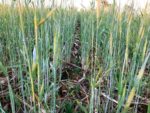Advertise Follow Us
Items Tagged with 'Jim Stute'
ARTICLES
Join No-Till Farmer on a road trip across southern Wisconsin in this week’s episode of the podcast, brought to you by SOURCE®️ by Sound Agriculture.
Read More
Crop Protection
On-Farm Trials Show Cover Crops, Planting Green Can Suppress Weeds
Glyphosate-resistant weeds are suppressed by planting green, cover crop implementation and termination timing adjustment, according to on-farm trials.
Read More
Free Webinar: Planting Green to Suppress Glyphosate-Resistant Weeds
National Cover Crop Summit Returns March 14-16
Read More
Learn to Successfully Incorporate Cover Crops into Your No-Till Operation
The all-virtual National Cover Crop Summit offers free expert advice about top cover crop trends, planting green, equipment & more.
Beat Glyphosate-Resistant Weeds by Planting Green
In the fight against increasing herbicide resistance, the practice of planting green into a living cover crop offers weed suppression and potential money savings.
Read More










